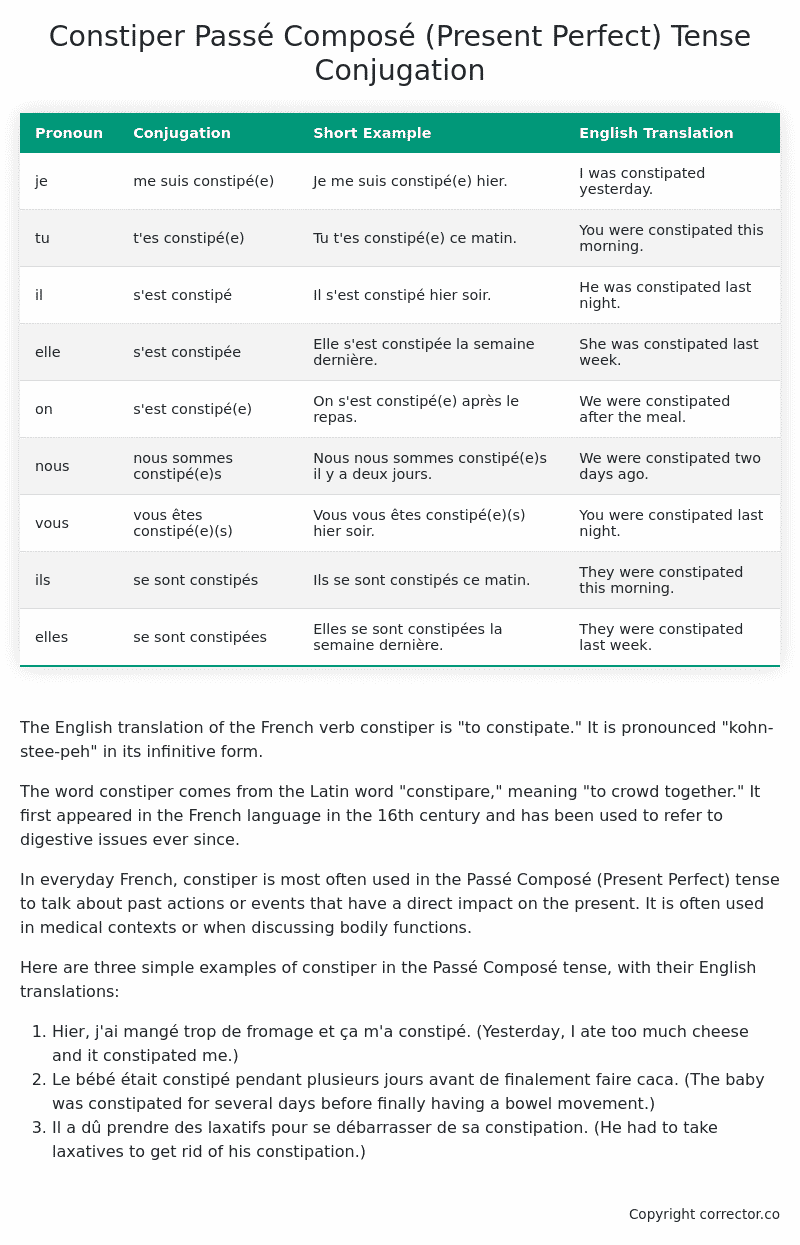Passé Composé (Present Perfect) Tense Conjugation of the French Verb constiper
Introduction to the verb constiper
The English translation of the French verb constiper is “to constipate.” It is pronounced “kohn-stee-peh” in its infinitive form.
The word constiper comes from the Latin word “constipare,” meaning “to crowd together.” It first appeared in the French language in the 16th century and has been used to refer to digestive issues ever since.
In everyday French, constiper is most often used in the Passé Composé (Present Perfect) tense to talk about past actions or events that have a direct impact on the present. It is often used in medical contexts or when discussing bodily functions.
Here are three simple examples of constiper in the Passé Composé tense, with their English translations:
- Hier, j’ai mangé trop de fromage et ça m’a constipé. (Yesterday, I ate too much cheese and it constipated me.)
- Le bébé était constipé pendant plusieurs jours avant de finalement faire caca. (The baby was constipated for several days before finally having a bowel movement.)
- Il a dû prendre des laxatifs pour se débarrasser de sa constipation. (He had to take laxatives to get rid of his constipation.)
Table of the Passé Composé (Present Perfect) Tense Conjugation of constiper
| Pronoun | Conjugation | Short Example | English Translation |
|---|---|---|---|
| je | me suis constipé(e) | Je me suis constipé(e) hier. | I was constipated yesterday. |
| tu | t’es constipé(e) | Tu t’es constipé(e) ce matin. | You were constipated this morning. |
| il | s’est constipé | Il s’est constipé hier soir. | He was constipated last night. |
| elle | s’est constipée | Elle s’est constipée la semaine dernière. | She was constipated last week. |
| on | s’est constipé(e) | On s’est constipé(e) après le repas. | We were constipated after the meal. |
| nous | nous sommes constipé(e)s | Nous nous sommes constipé(e)s il y a deux jours. | We were constipated two days ago. |
| vous | vous êtes constipé(e)(s) | Vous vous êtes constipé(e)(s) hier soir. | You were constipated last night. |
| ils | se sont constipés | Ils se sont constipés ce matin. | They were constipated this morning. |
| elles | se sont constipées | Elles se sont constipées la semaine dernière. | They were constipated last week. |
Other Conjugations for Constiper.
Le Present (Present Tense) Conjugation of the French Verb constiper
Imparfait (Imperfect) Tense Conjugation of the French Verb constiper
Passé Simple (Simple Past) Tense Conjugation of the French Verb constiper
Passé Composé (Present Perfect) Tense Conjugation of the French Verb constiper (this article)
Futur Simple (Simple Future) Tense Conjugation of the French Verb constiper
Futur Proche (Near Future) Tense Conjugation of the French Verb constiper
Plus-que-parfait (Pluperfect) Tense Conjugation of the French Verb constiper
Passé Antérieur (Past Anterior) Tense Conjugation of the French Verb constiper
Futur Antérieur (Future Anterior) Tense Conjugation of the French Verb constiper
Subjonctif Présent (Subjunctive Present) Tense Conjugation of the French Verb constiper
Subjonctif Passé (Subjunctive Past) Tense Conjugation of the French Verb constiper
Subjonctif Imparfait (Subjunctive Imperfect) Tense Conjugation of the French Verb constiper
Subjonctif Plus-que-parfait (Subjunctive Pluperfect) Tense Conjugation of the French Verb constiper
Conditionnel Présent (Conditional Present) Tense Conjugation of the French Verb constiper
Conditionnel Passé (Conditional Past) Tense Conjugation of the French Verb constiper
L’impératif Présent (Imperative Present) Tense Conjugation of the French Verb constiper
L’infinitif Présent (Infinitive Present) Tense Conjugation of the French Verb constiper
Struggling with French verbs or the language in general? Why not use our free French Grammar Checker – no registration required!
Get a FREE Download Study Sheet of this Conjugation 🔥
Simply right click the image below, click “save image” and get your free reference for the constiper present perfect tense conjugation!

Constiper – About the French Passé Composé (Present Perfect) Tense
Formation of the Passé Composé
Set the auxiliary verb with either
Conjugate the auxiliary verb
Add the past participle
Common everyday usage patterns
Narrating Past Events
Sequential Actions
Describing Completed Actions
Interactions with other tenses
Imperfect Tense
Conditional and Future Tenses
Summary
I hope you enjoyed this article on the verb constiper. Still in a learning mood? Check out another TOTALLY random French verb conjugation!


